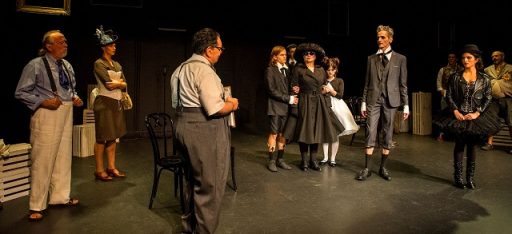Reviewed by LindaAnn LoSchiavo for L’Idea
“The harder the struggle for life and the more one’s weakness is felt, the greater becomes the need for mutual deception.” — — Luigi Pirandello
Born in Sicily, Luigi Pirandello [28 June 1867 – 10 December 1936] was a dramatist, novelist, poet, and short story writer. In the United States, however, the Italian Nobel Prize winner is best known for his theatre work.
In 1920, already well established as a novelist, he wrote his slim stage farce “Chee-Chee” [Cecè]. In 1923, another “half act” play appeared: “The Man with the Flower in His Mouth” [L’uomo dal fiore in bocca]. Due to their brevity, these two require the presence of something more to fill out a performance. Director Patrick Mulryan got the idea to remix these texts with scenes from “Six Characters in Search of an Author” [Sei personaggi in cerca d’autore] from 1921. Judging by the applause at Theatre 71, this bold stroke succeeded with members of the audience, some of whom were perhaps meeting Pirandello for the first time.
A drab, minimal set — crates, chairs, a table, and a telephone — was balanced by a visually arresting, Victorian steampunk look, thanks to Costume Designer Maureen Freedman. The show-stopping moment when the “six characters” interrupt a rehearsal of “Chee-Chee,” advancing onto the set from backstage, looking almost as morbidly attired as the Addams Family, was wonderfully executed and memorable.
Another stand-out in this intriguing two-hour mash-up was “The Man with a Flower in His Mouth,” the poignant two-hander adapted from Pirandello’s novella “La Morte Adosso” (1923) and ably brought to life by Jennifer Jewell, ghoulishly made up, and Robert Charles Russell, as the bland commuter. The “flower” is a late-stage throat cancer and the dialogue is between a patient, who knows death is upon him, and a businessman who missed his train and wants to kill time at a café.
Here’s the dying man’s heart-wrenching epitelioma speech in Italian:
Mi lasci dire! Se la morte, signor mio, fosse come uno di quegli insetti strani, schifosi, che qualcuno inopinatamente ci scopre addosso… Lei passa per via; un altro passante, all’improvviso, lo ferma e, cauto, con due dita protese le dice: “Scusi, permette? lei, egregio signore, ci ha la morte addosso ”. E con quelle due dita protese, la piglia e butta via… Sarebbe magnifica! Ma la morte non è come uno di questi insetti schifosi. Tanti che passeggiano disinvolti e alieni, forse ce l’hanno addosso; nessuno la vede; ed essi pensano quieti e tranquilli a ciò che faranno domani e doman l’altro. Ora io, caro signore, ecco… venga qua… qua sotto questo lampione… venga… le faccio vedere una cosa… Guardi, qua, sotto questo baffo… qua, vede che bel tubero violaceo? Sa come si chiama que sto? Ah, un nome dolcissimo… più dolce d’una caramella: – Epitelioma, si chiama. Pronunzii, sentirà che dolcezza: epitelioma … La morte, capisce? è passata. M’ha ficcato questo fiore in bocca, e m’ha detto : – “Tientelo, caro: ripasserò fra otto o dieci mesi!”
Translated into English (see below), the monologue retained its poetic pathos in Jennifer Jewell’s riveting delivery. This act was hard to follow, nevertheless one final scene was presented from “Six Characters” and then “Raison d’Etre” ended.
Alas, the cast’s ability was uneven. Along with the compelling Ms. Jewell, the strongest players were: Brian Linden (Father), Lucie Allouche (Step-Daughter), Melissa Eddy Quilty (Madama Pace), and Rachel Lauren James (Nada).
Some puzzling choices popped up. For example, Chee-Chee is written as a scoundrel and a ladies man — — yet actor Mickey Abbate camps it up, making Chee-Chee too gay and outlandish. The part calls for more deviousness and subtlety when he’s dealing with one-eyed Squatriglia as well as some romantic sizzle when Chee-Chee asks Nada to “pay him back” with kisses. It felt like Abbate was channeling Liberace instead of Heath Ledger.
Translators were Roberto Di Donato, Giovanni Villari, and Edward Storer.
“Raison d’être: an Evening of Pirandello” will be onstage here until September 29, 2018: Theatre 71 at Blessed Sacrament, 152 West 71st Street, NYC 10023.
Remaining Performances are: 7:00 PM on September 25 thru 29, 2018
PHOTO CREDIT: Daniel Rader
The man with the flower in the mouth.
Let me tell you! My sir, if death would be like one of those weird, disgusting insects that someone unexpectedly discovers on us … You pass by; another passerby, suddenly, stops you and, cautiously, with two outstretched fingers tells you: “Excuse me, please? You, my dear sir, have the death on you .” And with those two fingers stretched out, takes it and throws it away … It would be magnificent! But death is not like one of these lousy bugs. So many who are strolling casually and unaware, maybe they have it on; nobody sees her; and they think, peaceful and serene, about what they will do tomorrow and the day after tomorrow. Now I, dear sir, here … come here … here under this lamp … come … I’ll show you a thing … Look, here, under this mustache … here, see what a beautiful purple growth? Do you know what this is called? Ah, a very sweet name … sweeter than a candy: – Epithelioma, is called. Pronounce it, you will feel that sweetness: epithelioma … Death, do you understand? passed by. She has stuck this flower in my mouth, and has told me: – “Keep it, dear: I’ll be back in eight or ten months!”

